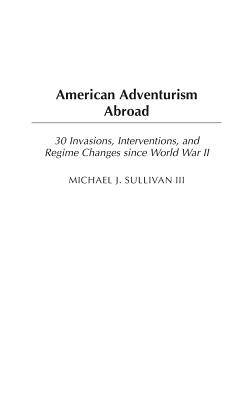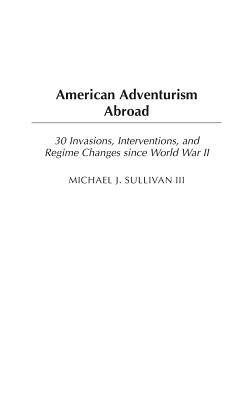
- Afhalen na 1 uur in een winkel met voorraad
- Gratis thuislevering in België vanaf € 30
- Ruim aanbod met 7 miljoen producten
- Afhalen na 1 uur in een winkel met voorraad
- Gratis thuislevering in België vanaf € 30
- Ruim aanbod met 7 miljoen producten
Zoeken
American Adventurism Abroad
30 Invasions, Interventions, and Regime Changes since World War II
Michael Sullivan
Hardcover | Engels
€ 161,45
+ 322 punten
Omschrijving
This book provides a comparative analysis of 30 American interventions into Third World countries. An historical approach is used to place the featured cases into a more general history of American Diplomacy. The author uses his assessments to prove that U.S. foreign policy has been driven by the goal of being the ultimate power in the global capitalist economic system. The author makes his work unique by giving a critical view of America's place in the world during an anticipated time of war and raised patriotism. He provides a scholarly look at U.S. diplomacy leading up to the era of the War on Terror.
Sullivan explains how over the past 50 years the U.S. has come to succeed Europe as ruler of the global economic system. The political systems which have been promoted by the U.S. to preserve worldwide capitalism range from one-party rule to monarchies and recurring civil war. The interventions discussed have proved to be short-term successes for U.S. policy, but more often tragic for the local societies affected. Sullivan draws on his 1996 release Comparing State Polities to create a number of tables that place U.S. involvement into geographic and hierarchic perspective. The reader is ultimately provided with a provocative thesis that challenges traditional interpretations of America's role in the world. This book will be an asset to any undergraduate college student taking classes in political science or history. It will also appeal to a general audience.Specificaties
Betrokkenen
- Auteur(s):
- Uitgeverij:
Inhoud
- Aantal bladzijden:
- 208
- Taal:
- Engels
Eigenschappen
- Productcode (EAN):
- 9780275972769
- Verschijningsdatum:
- 30/08/2004
- Uitvoering:
- Hardcover
- Formaat:
- Genaaid
- Afmetingen:
- 169 mm x 244 mm
- Gewicht:
- 458 g

Alleen bij Standaard Boekhandel
+ 322 punten op je klantenkaart van Standaard Boekhandel
Beoordelingen
We publiceren alleen reviews die voldoen aan de voorwaarden voor reviews. Bekijk onze voorwaarden voor reviews.











